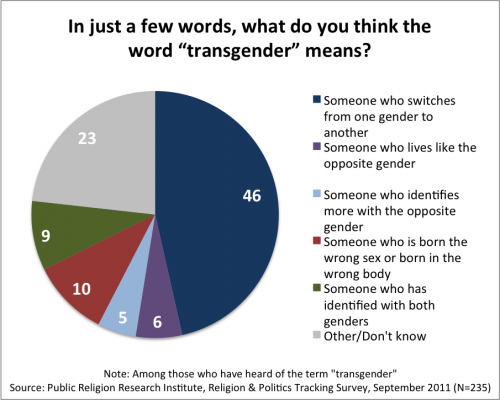I. Rights and Protections for Transgender People
The majority of Americans agree that transgender people should have the same general rights and legal protections as others.* Approximately 9-in-10 (89%) Americans agree that transgender people deserve the same rights and protections as other Americans.
Majorities of all major religious groups agree that transgender people should have the same rights and protections as other Americans, including approximately 8-in-10 (83%) white evangelical Protestants, and roughly 9-in-10 Catholics (93%), white mainline Protestants (90%), and the unaffiliated (95%). Overwhelming majorities of Republicans (86%), Independents (94%), and Democrats (92%) also agree. More than 8-in-10 (81%) Americans agree that legal protections for gay and lesbian people should also include transgender people.
II. Strong Support for Employment Nondiscrimination Laws
Approximately three-quarters of Americans both say Congress should pass employment nondiscrimination laws to protect transgender people, and favor Congress’s recent expansion of hate crimes legislation to protect transgender people. Three-quarters of Americans agree that Congress should pass laws to protect transgender people from job discrimination.
Solid majorities of every major religious group agree that Congress should pass laws to protect transgender people from job discrimination, including nearly two-thirds (65%) of white evangelical Protestants. A majority (55%) of Republicans agree that Congress should pass laws to protect transgender people from job discrimination, as do overwhelming majorities of Independents (79%) and Democrats (86%).
Approximately three-quarters (74%) of Americans also favor Congress’ recent expansion of federal hate crime laws to include crimes committed on the basis of the victim’s gender, sexual orientation or gender identity, compared to only 22% who oppose.
Solid majorities of every major religious group favor Congress’ recent expansion of hate crimes legislation to include gender identity. White evangelical Protestants demonstrate the lowest support, but nearly two-thirds (64%) of this group favor including gender identity in hate crimes laws. A majority of Republicans (56%) and approximately 8-in-10 Independents (79%) and Democrats (84%) also agree.
III. Most Americans Knowledgeable about the Term Transgender
Approximately two-thirds of Americans both report being well informed about transgender people and issues, and generally understand what the term “transgender” means. Two-thirds of Americans agree that they feel well informed about transgender persons and issues, while 3-in-10 disagree.
In order to determine whether Americans understood the term “transgender,” PRRI conducted a follow-up survey in September 2011 that asked respondents to report what the term “transgender” meant to them in their own words. Among the 91% of Americans who report that they have heard of the term transgender, 76% give an essentially accurate definition. Thus, overall, more than two-thirds (69%) of Americans are able to identify what the term “transgender” means without any assistance. Forty-six percent define a transgender person as someone who switches from one gender to another, either generally (39%) or through a medical procedure (7%). Eleven percent define a transgender person as someone who lives like the opposite gender (6%) or identifies more with the opposite gender (5%). Ten percent describe a transgender person as someone who is born the wrong sex or born in the wrong body. Nine percent define a transgender person as someone who has identified with both genders.
The following are examples of verbatim responses:
- “A person who feels like they are more like the other sex”
- “It’s someone born one sex, and they think they’re another”
- “Generally someone who thinks they are in the wrong body”
Eleven percent of Americans say that they have a close friend or family member who is transgender, compared to 58% who say that they have a close friend or family member who is gay or lesbian.
*In order to test the effects of knowledge levels about the term “transgender,” half of the sample was given a basic definition of the term before answering a battery of questions, while the other half of the sample was not given a definition. The supplied definition read as follows: “The term ‘transgender’ applies to people who live out their gender in a way that does not match the sex listed on their original birth certificate, or who physically change their sex.” There were no significant differences in the responses between the two groups. Responses in this memo are for the full sample.
Recommended citation:
Jones, Robert P., and Daniel Cox. “Most Americans Favor Rights and Legal Protections for Transgender People.” PRRI. 2011. http://www.prri.org/research/american-attitudes-towards-transgender-people/.



